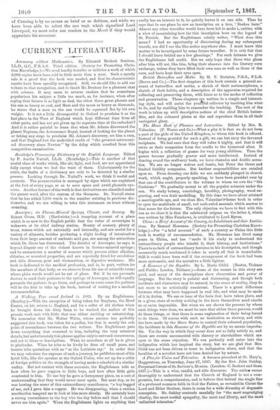A Walking Tour round Ireland in 1865. By an Englishman.
(Bentley.)—With the exception of being taken for Stephens, the Head Centre, on his return to England, and for a seller of old clothes when he brought down his dirty linen to be washed, the author of this prosaic work met with little that was either exciting or entertaining. We remember that Mr. Walter White, whose success has probably suggested this book, was taken for a pedlar, but that is nearly the sole point of resemblance between the two writers. The Englishman puts down everything that occurred to him, including the very minutest details, but unfortunately this phrase applies only to outward occurrences, and not to ideas or descriptions. When he moralizes at all he is given to platitudes. When he tries to be lively he fires off small pans, and inserts trite quotations with an " as the Latinists say." In order that we may calculate the expense of such a journey, he publishes most of his hotel bills, like the speaker at the Oxford Union, who set up for a critic of foreign politics on the strength of having made a schedule of a similar outlay. But not content with these accounts, the Englishman tells us how often he gave coppers to little boys, and how often little girls courtesied to him. To one boy he gave a threepenny piece, on a sort of understanding that they would never meet again. But next day, as he was leaving the scene of this extraordinary munificence, "a boy begged of me, and I gave him a copper. He was disappearing, when a sudden recollection tempted me to look at him more closely. He certainly bore a strong resemblance to the boy who the day before said that I should never see him again." When the Englishman lights on anything that
really has an interest in it, ho quietly leaves it on one side. Thus he says that in one place he saw an inscription on a tree, ';Snakes here." Almost any other traveller would have been led to make i..auiries, with a view of ascertaining how far this inscription bore on the legend of St. Patrick. But the Englishman calmly writes, "What does this mean ? I had no opportunity of discovering daring my subsequent travels, nor did I see the like notice anywhere else. I must leave this. matter to be investigated by some future traveller. It is only fair that I should leave behind me a few gleanings." For such fairness we give the Englishman fall credit. But we only hope that those who glean after him will not, like him, bring their sheaves into the literary corn exchange, unless they have filled their own ears as well as those of the corn, and have kept their eyes open.






























 Previous page
Previous page